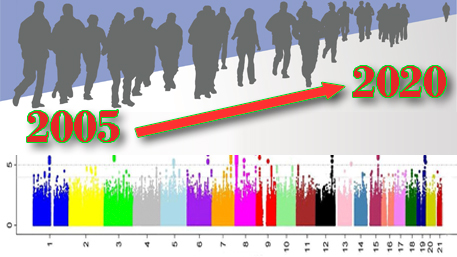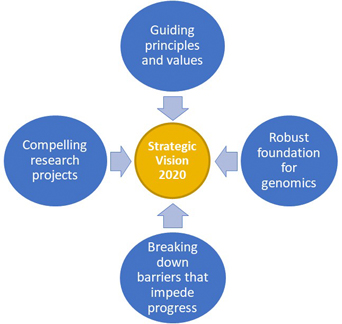Genomics and Precision Health Blog – Archive Posts
15 Years of Genome-wide Association Studies: What’s the Public Health Impact?

Genome-wide association studies (GWAS) test thousands or millions of genetic variants scattered throughout the human genome for association with human traits or diseases. GWAS burst onto the scientific scene in 2005 and have been enabled by technological advances and falling prices. A recent commentary in Nature Communications summarized the state of the science: To date, Read More >
Posted on byHappy Thanksgiving 2020: Family and Family Health History Are As Important As Ever

This Thanksgiving might not look the same as the ones before it, but some things haven’t changed. Even if you can’t see your loved ones in person, Thanksgiving is still a great time to talk to your family members about your family health history. Having one or more family members with a disease can mean Read More >
Posted on byAssessing the Value for Money of Using Genome Sequencing in Child Health

If you have a child with a neurodevelopmental condition, such as autism, epilepsy, or unexplained developmental delay, finding a genetic cause for his/her condition can bring peace of mind and avoid what seems like an endless cycle of medical evaluations and tests. The application of next generation sequencing (NGS) methods, including sequencing the protein-coding region Read More >
Posted on byA New Vision for Using Genomics to Improve Health: An Expanded Role for Public Health

The National Human Genome Research Institute (NHGRI) recently published a new strategic vision 2020 to identify research priorities and opportunities in human genomics for improving health. The framework includes four main areas: guiding principles and values, a robust foundation for genomics, breaking down barriers that impede progress, and compelling research projects. Since the completion of Read More >
Posted on by 1 CommentGenomic Medicine is Here: We Need More Data on Implementation and Outcomes

The use of genomic tests in clinical research and practice continues to accelerate in the United States and around the world. For almost a decade, the Genetic Testing Registry (GTR) at the National Institutes of Health has continued to track the growth and development of genomic tests. As of October 28, the GTR lists 76,835 Read More >
Posted on by 1 CommentPrecision Medicine in Action: How can we make cascade screening for hereditary conditions work best in the real world?

If someone in your family were diagnosed with a genetic condition, would you want to be tested for that condition as well? For some disorders, like Huntington’s disease, for which there are no means available for prevention or cure, the question can be extremely difficult to answer. However, with many other conditions (for example familial Read More >
Posted on byA Strong Start: Enhancing Newborn Screening for Precision Public Health

As the capability to sequence an individual’s genome or exome continues to expand—and the cost continues to fall—more states are considering how next generation sequencing (NGS) could support their newborn screening programs, which test approximately four million babies born in the United States each year for congenital, treatable diseases. Results from NGS can help enhance Read More >
Posted on byHow Accessible Are Genetics Providers and How Can Access Be Increased?

The increase in clinical genetic testing, as well as direct-to-consumer testing, means a growing demand for genetic counseling services, which are often provided by genetic counselors. If patients are referred for genetic counseling, what barriers might they face in accessing these services? How can genetic counselors help address these barriers? Lack of State Licensure Currently, Read More >
Posted on byAre We Ready for Population Screening for Hereditary Hemochromatosis?

Hereditary Hemochromatosis (HH) is an inherited iron storage disorder in which the body builds up too much iron, damaging tissues and organs. In most people, HH is caused by two copies of a specific change (mutation) in the HFE gene which is most commonly found in people of European ancestry. In the United States, over Read More >
Posted on by 1 CommentArtificial Intelligence, Public Trust, and Public Health

As a data-driven agency, CDC has always had highly skilled statisticians and data scientists. As part of the Data Modernization Initiative, CDC is supporting strategic innovations in data science using artificial intelligence and machine learning (Ai/ML). Ai/ML is the practice of using mathematics with computers to learn from a wide range of data and make Read More >
Posted on by

